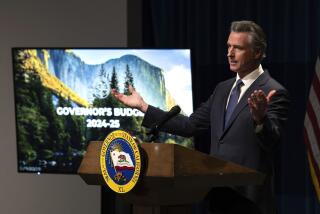Governors warn congressional leaders of billion-dollar shortfalls due to coronavirus
Three governors testified to Congress in a virtual hearing Tuesday, giving updates on the tolls of coronavirus, plans for reopening and the projected billion-dollar impact of the pandemic on state finances.
“COVID-19 has wreaked havoc on our budget,” Democratic Michigan Gov. Gretchen Whitmer told the House Committee on Commerce and Energy. The state faces a projected $6.2-billion drop in revenue in the next two years, and by some projections, over the next three years state budget shortfalls across the country are estimated to reach $765 billion.
Democratic Gov. Jared Polis said that Colorado would be “appreciative” of the $500 billion that would be made available by the Heroes Act, which the House passed May 15. Under that bill, which is currently waiting for a Senate vote, Colorado would receive $8.5 billion in federal funding over two years.
“Unlike the federal government, we have a balanced budget requirement,” Polis said. “States are unable to borrow.”
Without the Heroes Act — which some say is unlikely to get approval — Colorado would suffer “enormous cutbacks,” Polis said, starting with social service programs, safety net programs and Medicaid.
Whitmer explained that the biggest part of state budgets involve public health, safety and education. “Those are the front-line heroes we want to support, not undermine,” she said. “The bottom line is that we need additional flexibility and additional resources.”
Rep. Tim Walberg (R-Mich.) pressed Whitmer on whether every dollar from the CARES Act had been spent. “I wonder why Michigan is one of the states withholding funds from our local communities,” he said. “Our federal government did step up. ... Other states are doing it more effectively.”
Republican Arkansas Gov. Asa Hutchinson did not ask for increased federal funding and instead requested greater flexibility to spend some of his state’s $1.2-billion CARES Act provision later in the fall.
Whitmer also railed against the “unhelpful” federal government for its “failure” to provide adequate supplies and for pushing states into a bidding war for supplies sold by private companies. She said supply shipments, while helpful, have come in uneven waves and “don’t reflect what we’re planning for.”
“Each of these different COVID tests requires different types of swabs,” she said. “When we expect 180,000 diverse swabs, and we get 180,000 foam swabs, we’re grateful for the foam swabs but it means we can’t do those tests that require the other types of swabs.”
Whitmer suggested that the Defense Production Act be used to expedite production. She also said that instead of swabs, some other governors had received Q-tips.
Polis agreed. “We would love a way where it’s exactly clear what they will and won’t get,” he said.
Hutchinson acknowledged that federal assistance “got a little slow early on,” but praised Washington’s overall response. “My goodness,” he said. “In 90 days we ramped up the supply chain in one of the most massive investments in healthcare supplies that we’ve seen in history.”
Rep. Susan Brooks (R-Ind.) asked the governors about potential second waves of the coronavirus and how that fit in with each state’s plan for reopening public schools.
Hutchinson said that Arkansas is “very committed” to having school in the fall and is making plans for a” blended learning environment.”
“If we have to close for two days for cleaning the school or for other reasons, we can shift very quickly to online instruction for a couple days and then shift back to classroom instruction,” Hutchinson said.
The University of Arkansas will begin a phased return to campus on June 15 to prepare for the anticipated return of students in August, according to the school’s website.
Polis said temporary school closures in Colorado probably would last two weeks, to accommodate the virus’ incubation period and testing time.
Whitmer avoided specifics but mentioned that Michigan public schools probably would have to reduce class sizes in the fall.
More to Read
Get the L.A. Times Politics newsletter
Deeply reported insights into legislation, politics and policy from Sacramento, Washington and beyond. In your inbox three times per week.
You may occasionally receive promotional content from the Los Angeles Times.






